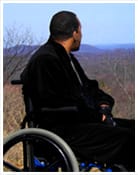You know that nursing home neglect can often lead to dehydration. It’s not intentional abuse — at least, not all of the time. It’s just the fundamental neglect of the person’s basic needs. That could mean not bringing them food and water as often as they need it, even though they are dependent on the care of others.
When you help your loved one move into a nursing home, you begin to worry about neglect and vow to watch out for the most common signs and symptoms. That starts with dehydration, so exactly what should you be looking for? A number of the most common symptoms are:
- Headaches that linger, even if they’re mild
- Constipation due to a lack of fluids to soften the stool
- Irritability that has no other cause
- Excessive cramping, which is most often in the legs and arms
- Dark yellow urine
- Urinary tract infections
- A general sense of dizziness, which may get worse whenever they stand up
- Fatigue and excessive sleepiness
- Repeated complaints about thirst — although it is important to note that many elderly people have a decreased sense of thirst and may not know how thirsty they are
- Weakness and trouble with physical tasks that should be possible
- A face that is flushed with warm, dry skin
- The onset of various sicknesses, such as a fever
These are not all of the potential symptoms, but they give you a good idea of what you should look out for. If your loved one is being neglected in a nursing home, there are legal steps that you can take to protect them.

